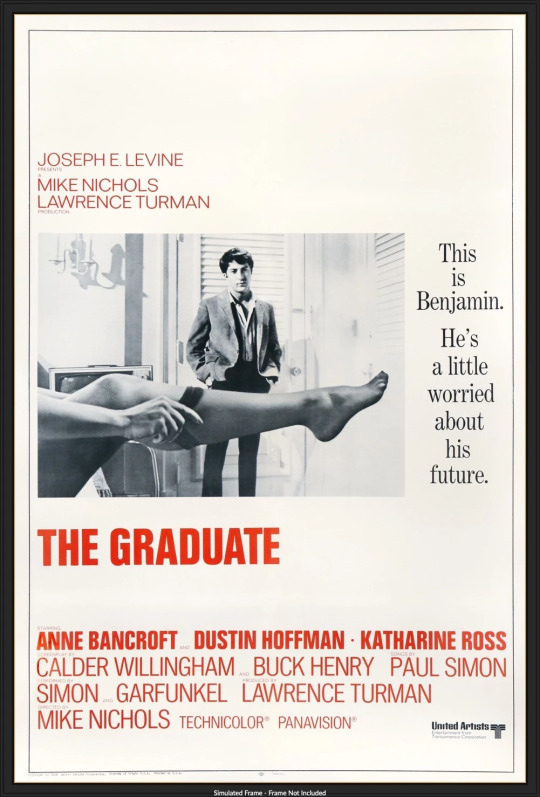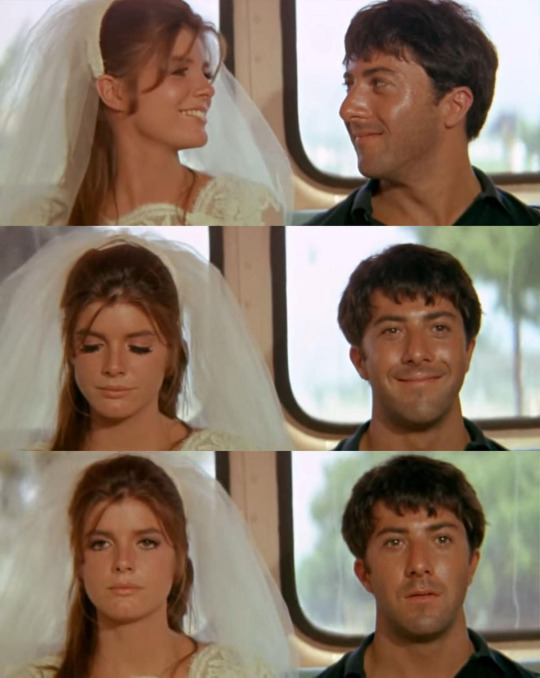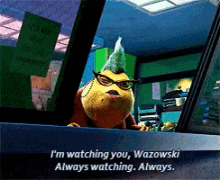Text
Dancing over Tacos


1 note
·
View note
Text




1 note
·
View note
Text

0 notes
Text
Queso Conversations

1 note
·
View note
Text
Granddad's Shoes

1 note
·
View note
Text
"Mrs. Robinson, Are You Trying to Isolate Me?": Class and Isolation in The Graduate
The other day, I made my husband watch one of my favorite films—The Graduate. It’s a bizarre 1967 film featuring Dustin Hoffman as Benjamin Braddock—a recent college grad who has no idea what he is going to do. On a whim, he decides to do something wild: he starts an affair with his father’s business partner’s wife, Mrs. Robinson. (You know the famous line: “Mrs. Robinson, you’re trying to seduce me”? Yep. That’s this film.)

Allow me to explain just how Benjamin managed to get himself in Mrs. Robinson’s bed.
Throughout the film, Benjamin is isolated. His rich, upper-class parents throw him lavish parties, but there are never any young people or friends of Benjamin’s—only his parents’ old rich buddies make the guest list. In one scene, Ben’s parents throw him a birthday party at their pool. His father announces that everyone should pay attention to the “feature attraction” of the party, which turns out to be Ben in a ridiculous scuba suit his father has purchased. Benjamin begs his father to not make him go out, but his father insists. The camera then gives an interesting shot—we see things from Benjamin’s point of view. We see his parents and their friends cheering, but all we hear is Ben’s steady breathing. And then we go underwater, see the bottom of the pool, and hear nothing but silence.
youtube
That seems to be the moment Ben decides to have the affair. As the camera flips perspectives, we watch Ben standing on the pool floor, and hear his voice calling Mrs. Robinson, nervously asking her if he can buy her a drink.
The affair with Mrs. Robinson is a feeble attempt to feel. Ben begs her to speak to him. “Look, for months, all we’ve done is come up here and leap into bed together…do you think we could liven it up with a little conversation for a change?” he says. But she won’t. She just wants to have sex and leave.
And then he meets Mrs. Robinson’s daughter Elaine.
At first, in an attempt to make Elaine hate him, he gives her the most awful date of her life. He won’t look at her or speak to her, just like Mrs. Robinson wouldn’t speak to him. He takes her to a strip club. There’s a weird scene where Benjamin is sitting deadpan with shades on, and a stripper is swinging boob-tassels above Elaine’s head as she sobs. But suddenly, Ben snaps. He screams “STOP IT!” and takes Elaine away, and they end up having a really good time. And that’s when everything changes for him. After one date, Benjamin decides he is in love with Elaine.
And that’s where it all tumbles downhill. (Spoiler alert: I’m about to tell you the ending.) Mrs. Robinson threatens to tell everyone exactly what they were doing, and in an attempt to avoid shame (or at least minimize it), Benjamin tells Elaine himself. She is repulsed, kicks him out, and leaves for college.
Fast forward several months: Benjamin decides to go to Elaine’s college to beg her to marry him. When he finds Elaine, she informs him that although she has already been proposed to by another classmate, she will consider his proposal. Her parents try to force her to marry the other man, but in a very climactic final scene, Benjamin rushes to the church and…well, rather then describe this in great detail, I’ll just have you watch the scene.
youtube
And scene. That’s it. That’s the ending. Bizarre, right? Hold that thought.
In his article “Lit Grit,” scholar Simon Lee writes that working-class narratives often “differentiat[e] the character from the community, often relegating the community to stereotypes while the protagonist is given greater dimension”. Lee suggests that we examine if “the novel seems to promote separation or alienation from the community to explore existential crises”.
I think The Graduate does exactly that, and in doing so, makes an interesting comment on class. Like Lee writes in his article, Benjamin is differentiated from the almost comically stereotypical rich community around him. Even his appearance—a young, college aged man—doesn’t fit in. He’s depressed and isolated. He tries to stay within that class, to stick with what he knows (i.e. Mrs. Robinson), but can’t seem to find meaning. He is very much having, as Lee phrases it in his article, an “existential crisis” (Lee 2).
And then he finds Elaine. And he leaves everything for her. The parties, the pool, the scuba suit, and moves into a cheap boarding house for college students. And, he ultimately convinces Elaine to go with him.
In the final scene, Elaine is just as isolated. She sees her father and mother and new husband gritting their teeth and yelling. But, in a weird allusion to the scuba scene, we don’t hear those sounds. All we hear is Ben, pounding and screaming.
Silence is clearly a motif here. In fact, out of all the songs on the soundtrack, it’s “The Sound of Silence” that is played three times throughout the film. I think it’s because silence is isolating and alienating. Silence is lonely.
In the final scene, when Ben and Elaine are on that bus, I think they are laughing because they are happy about what they’ve done. But then, as the camera pans out and “The Sound of Silence” begins to play once again, their expressions begin to change. I think they are suddenly realizing Oh my god, what have we done? They both grew up in the upper class, but now they have quite literally fled from it all. Arguably, they can never go back. And there, on that bus, it becomes clear that they are isolated once again. Isolated from their rich parents and people of their past, and surrounded by just regular working folks on a bus. And in that moment, suddenly they realize what they've done: placed themselves in a whole new class. And suddenly, they have no idea what to do.

Works Cited
Lee, Simon. "Lit Grit: The Gritty and Grim in Working-Class Cultural Production." Routledge International Book of Working Class Studies, Routledge, 2020.
0 notes
Text
a day spent on chilly long beach island

1 note
·
View note
Text
Smart Sentences
Chapter 5 of Stylish Academic Writing by Helen Sword talks about “Smart Sentences.” It advises writers on how to (you guessed it) write sentences smartly. I love the opening lines of the chapter:
“A carefully crafter sentence welcomes its reader like a comfortable rocking chair, bears its readers across chasms like a suspension bridge, and helps its readers navigate tricky terrain like a well-hewn walking stick. A poorly crafted or uncrafted sentence, on the other hand, functions more like a shapeless log tossed into a river: it might or might not help you get to the other side, depending on how strong the current is, and how long you are willing to kick. And sometimes, the reader of an academic text has to kick very hard indeed.” (48)
First of all, talk about a well-crafted sentence. THOSE SIMILES. HELEN, MY GIRL. GET IT.

But seriously, she has a point. In any type of writing, whether academic or creative, well-crafted sentences are VITAL. I can’t tell you how many times I’ve been reading some essay or paper and gone, “...what?” Not because the concept doesn’t make sense, but because the sentence is just too long and too wordy. Sword gives writers the following tips to help us craft our sentences better so we create comfy rocking-chairs instead of drifting logs:
1. Use concrete language, especially when discussing abstract concepts.
2. Keep nouns and verbs close together
3. Avoid weighing down sentences with “clutter” (extra or unnecessary words and phrases, like too many adjective/adverbs, prepositions, or vague pronouns)
These seem like really practical things to do, but in reality, I think we get caught up a lot in trying to sound “smart” or “academic-y” and fall prey to bad sentence-formation. I know I tend to get too wordy sometimes, and read my sentences aloud only to realize, “Wait. I could have said in six words what I said in 40.” I have to keep my eye on my writing, like that weird monster lady in Monsters Inc.

(You can totally hear her voice in your head, right?)
All of this to say, these very practical tips remind me to watch for confusing, wordy sentences, and to try to create comfy rocking chairs for my readers to relax into rather than making them kick against the current.
Citation:
Sword, Helen. “Smart Sentencing.” Stylish Academic Writing. Harvard U P, 2012. pp. 48-62.
0 notes
Text
Writing Prompt 8

1 note
·
View note
Text

PhD here I come.
1 note
·
View note
Text
Step One
Last week, I made a big step. I reached out to a professor whom I greatly admire and truly enjoy working with, and popped a very big question.
Will you be my dissertation director?
She said yes, and I was ECSTATIC to say the least. We started talking timelines and when I will be doing comps and proposal and writing my dissertation..And then it all hit me. I am so close to being done.
When I was finishing my BA and my MA, people would say, “Oh, you’re almost done!” And I would jokingly say, “Yes, there’s light at the end of the tunnel. But I’m getting a PhD, so the light just leads right into another tunnel.” But now I see it. I see the light. There is a light at the end of ALL these tunnels, and I am one step closer to being actually done with my degrees. This is it. The end goal. And then I have the rest of my life ahead of me.
So I did it. I took step one. I have a director. And now I am one step closer to being done. There’s still so much ahead of me, but taking this step feels big. Massive. And like a tangible marker to the beginning of the end.
This is it. The beginning. The beginning of the end.
Here we go.
1 note
·
View note
Text
Writing Prompt 7
Wow. This summer and semester has been nuts, and I said I would post writing prompts everyday, but I very clearly have not. When I was doing it, it was so therapeutic and good for my mental health, so I need to pick it back up. Here’s my most recent writing.

#memories#writing prompt#Old Friend from Far Away#natalie goldberg#grandmother#I remember#creative writing
1 note
·
View note
Text
Writing Prompt 6






#memories#writing prompt#old friend from far away#natalie goldberg#bread and butter#bottle#hills#mist#library#life#creative writing
2 notes
·
View notes
Text
Black Lives Matter



#blm#black lives matter#ta-nehisi coates#between the world and me#black voices#listen#racism#anti-racist#race#remember george floyd#personal
0 notes
Text
Writing Prompt 5

#vice#vices#smoking#cigarettes#old friend from far away#natalie goldberg#writing#writer#writing prompt#creative writing
2 notes
·
View notes
Text
Writing Prompt 4

#writing#writing prompt#old friend from far away#natalie goldberg#reading#reading is fun#reader#green eggs and ham#dr seuss#kids#teacher#tutor#book#student#creative writing
4 notes
·
View notes
